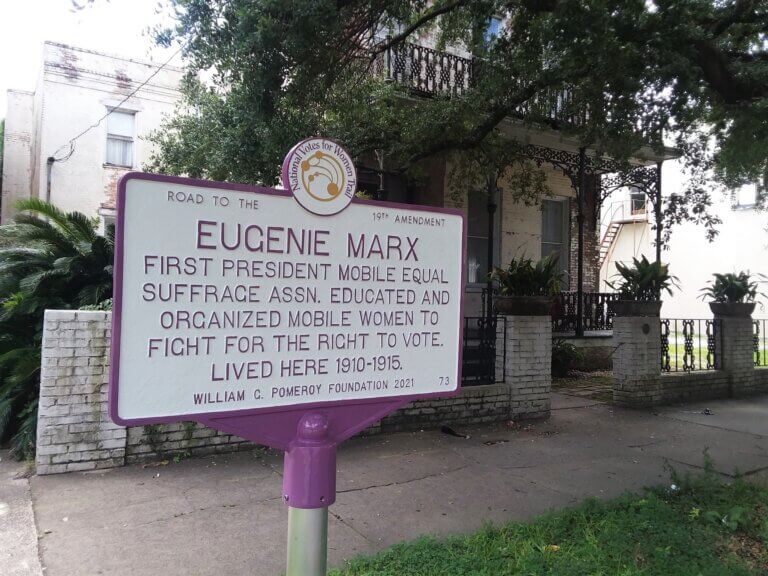EUGENIE MARX
- Program
- Subject
- Location
- Lat/Long
- Grant Recipient
-
National Votes for Women Trail
-
House, People
- 805 Government St, Mobile, AL 36602, USA
- 30.6863984, -88.0523732
-
National Collaborative for Women's History Sites
EUGENIE MARX
Inscription
EUGENIE MARXFIRST PRESIDENT MOBILE EQUAL
SUFFRAGE ASSN. EDUCATED AND
ORGANIZED MOBILE WOMEN TO
FIGHT FOR THE RIGHT TO VOTE.
LIVED HERE 1910-1915.
WILLIAM G. POMEROY FOUNDATION 2021
In 1913, Eugenie Marx was elected as the first President of the Mobile Equal Suffrage Association (ESA), a local organization affiliated with the state-wide Alabama Equal Suffrage Association. Early in her career, she participated in voiceless window speeches and published suffrage poems. Eugenie’s “Battle Song of the Marching Women” was published in the November 9, 1913 issue of The Birmingham News; verse one summarizes the state of inequality and rallies suffragists to continue their efforts:
Break those man-forged chains, O sisters,
Twist, pull, jerk again, again.
See, you are free to strike for your long-stolen womanhood.
Now raise your toll-bent shoulders, slowly, as you cast aside the submission
of centuries;
Breathe deep that untainted air of hovering justice;
Flinch not at the rocky winding paths, you can now see the dawn of recognized
womanhood;
Gaze with steady, far-reaching eyes; advance! advance!
Press on, press on through the ranks of your opponents.
Remember, unbinded-eyed Justice waits for you, with Freedom by her side.
You lost them both when the so-called master, man, misused his strength.
Although the Mobile ESA was initially inactive from 1913 to 1915, Eugenia is credited with recruiting “about 250 members” during this period. By 1915, the Mobile ESA was a visible and active organization due to Eugenia’s attendance at the Alabama Equal Suffrage Convention in Tuscaloosa as well as suffragist meetings hosted by the Mobile chapter.
Eugenie Marx was a teacher and, later, the principal of the Oakdale Kindergarten in Mobile. Her background as an educator influenced her suffragist ideals as she sought the vote as a way to improve the lives of women and their families. In her letter to the editor of The American Jewish Chronicle in 1917, she wrote:
Men have said for countless ages that woman’s place is in the home; no one denies the truth of that assertion. But men are slowly beginning to see the absurdity and injustice of denying women a voice in shaping the environment of their children, the future citizens of the country…Suffrage gives a woman a broader outlook—it gives her a sense of responsibility; makes her see and feel outside the narrow limits of her own home; makes her realize her relations to other homes and children outside her own little world. Surely an unselfish and intelligent woman makes a better wife and mother when she feels the relation of her home and family to the state.
As of 2021, the marker commemorating Eugenie Marx stands outside the home at 805 Government Street that she and her family lived in from 1910 to 1915.

